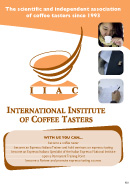Italian Espresso tasting course just before the Host show in Milan (20 October 2011)
by Carlo Odello *

We just scheduled an Espresso Italiano Tasting course just the day before the Host show in Milan (20 October 2011). Many professionals wrote us asking about this course: here it is! The course will take place in Brescia, hometown to the International Institute of Coffee Tasters. This means just 1,5 hours fom the Host show in Milan.
Why should you attend an Espresso Italiano Tasting course? I can think of many good reasons, but one seems to me the most important: to go back to the roots of Espresso, to understand the culture in which it was born.
I have been working in the coffee business for some years (not counting the years I was at the university but already spent some time at the events of the International Institute of Coffee Tasters and of the Italian Espresso National Institute). And I have been travelling around the world in the last few years training people how to taste Italian Espresso.
What did I discover? Easy to say: coffee is culture, means it is strongly connected to real life. It is like Chinese tea: you cannot understand it unless a Chinese explains it to you. That’s because he or she is Chinese and was born and raisen up in the real Chinese tea culture. The same for Japanese tea. And for any other specific tea culture.
Let us make you discover the real Italian Espresso culture. If you are interested in understanding how to recognize and evaluate the real Italian Espresso, just download the brochure from the link below. You can also drop me an email at carlo.odello@italiantasters.com if you need further information about the course.
Download:
Italian Espresso Tasting course: brochure (PDF)
* Trainer and member of the board of the International Institute of Coffee Tasters

